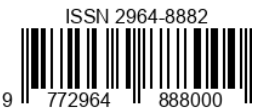Trinitas dan Tri Murti : Tinjauan Religionum terhadap Trinitas Kristen dan Trimurti Hindu Serta Implikasinya bagi Kerukunan Umat Beragama
DOI:
https://doi.org/10.55606/lumen.v3i2.395Keywords:
Trinity, Trimurti, Religious HarmonyAbstract
Religious conflicts in Indonesia still occur to this day even though Indonesia is known as a plural country. There are still claims that the teachings of one religion are better than other religions. In this study, the author discusses the concept of the Trinity in Christianity and Trimurti in Hinduism, and the implications of both concepts for inter-religious harmony. The Trinity, consisting of the Father, Son, and Holy Spirit, is the core of Christianity that emphasises unity and diversity in one God. The Trimurti consisting of Brahma (Creator), Vishnu (Sustainer), and Shiva (Destroyer) describes different aspects of God in Hinduism. Analyses were conducted using a religio-cultural approach to understand how these two concepts can complement or contradict each other. The research shows that although there are fundamental differences in the understanding of divinity between Christianity and Hinduism, there are also common points that can be used as a basis for interfaith dialogue. This research provides theological insights and practical solutions to create social harmony.
References
Buku
Bakry, H. (2014). Ilmu perbandingan agama. Jakarta: Wijaya.
Boland, B. J. (2011). Intisari iman Kristen. Jakarta: BPK Gunung Mulia.
Browning, W. R. F. (2015). Kamus Alkitab. Jakarta: Gunung Mulia.
Dister, N. S. (2014a). Pengantar teologi. Yogyakarta: Kanisius.
Dister, N. S. (2014b). Teologi Trinitas. Yogyakarta: Kanisius.
Dister, N. S. (2015). Kristologi: Sebuah sketsa. Yogyakarta: Kanisius.
Djam’annuri. (2014). Agama kita: Perspektif sejarah agama-agama. Yogyakarta: Kurnia Kalam Semesta.
Douglas, J. D. (2016). Ensiklopedia Alkitab masa kini (Vol. 2, M-Z). Jakarta: Yayasan Komunikasi Bina Kasih.
Hadiwijono, H. (2015). Iman Kristen. Jakarta: BPK Gunung Mulia.
Loshe, B. (2014). Pengantar sejarah dogma Kristen. Jakarta: BPK Gunung Mulia.
Lumbantobing, D. (2014). Teologi di pasar bebas. Pematangsiantar: L-SAPA.
Milne, B. (2014). Mengenali kebenaran. Jakarta: BPK Gunung Mulia.
Nugrahani, F. (2014). Dalam penelitian pendidikan bahasa. 信阳师范学院.
Romdhon. (2014). Agama-agama di dunia. Yogyakarta: IAIN Sunan Kalijaga Press.
Soedarmo, R. (2014). Kamus istilah teologi. Jakarta: BPK Gunung Mulia.
Soekmono, R. (2016). Pengantar sejarah kebudayaan Indonesia 2. Yogyakarta: Kanisius.
Sukayasa, I. K. (2017). Widya Upadesa: Buku pelajaran agama Hindu untuk kelas 2. Denpasar: Widya Dharma.
Susabda, Y. B. (2016). Mengenal dan bergaul dengan Allah. Yogyakarta: ANDI.
Urban, L. (2014). Sejarah ringkas pemikiran Kristen. Jakarta: Gunung Mulia.
Verkuyl, J. (2015). Aku percaya. Jakarta: BPK Gunung Mulia.
vireśvarānanda, S. (2009). Brahma sūtra 1.1.2. Surabaya: Pāramita.
Vorgrimler, H. (2015). Trinitas: Bapa, Firman, Roh Kudus. Yogyakarta: Kanisius.
Sumber Internet dan Wawancara:
Deripriana. (2023). Konsep dewa dalam Hindu. Diakses pada 3 April 2023, dari https://deripriana.wordpress.com/category/konsep-dewa-dalam-hindu
Siwa Kumar, S. (2023, Mei 13). Wawancara. [Gurkel termuda Agama Hindu yang melayani di Kuil beraliran Siwa di Binjai dan Dosen Universitas Sumatera Utara Fakultas Sosiologi].
Downloads
Published
How to Cite
Issue
Section
License
Copyright (c) 2024 Agus Parasian Sinaga, Demosari Fabriensy Nainggolan

This work is licensed under a Creative Commons Attribution-ShareAlike 4.0 International License.










